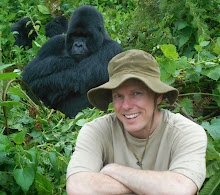
With the cleanup suspended for weather and the floating city evacuated, we're left hauling cargo to a small natural gas production platform in South Pass block 55. We're again dividing watches, 12 hours each, and I'm on days from 0600 to 1800. I awake at 0500 to a pounding offshore, the rough-seas morning ritual one of my least favorite, up there with a splitting-headache hangover. I lay in bed as long as possible, then struggle with sox and boots, manage to brush teeth, a shower and shave out of the question. The boat will run 20 knots even in 10-foot seas, but it will also knock your teeth out if you don't hold on. I take the wheel and we're almost there, a glimmer of hope for the day.
As a hurricane makes land in the southern Gulf, the stretch from the Venice Jump to the Head of Passes is lined with boats at anchor, and the crews from the floating city have been hoteled as their luck would have it, although I've never seen more than a light chop at the Baptiste jetties even with huge swells offshore; its protected by barrier islands. And while its rough enough below the delta to send even deep-water Responder boats up river, we head offshore with a series of containers and diesel tote tanks, 550 gallons each, chained and bound to the deck, and a few passengers.
We arrive at 55, a square yellow platform masking sunrise. I top the boat around, rolling steeply in the trough until the stern comes about to face the tremendous metal frame. I back our way under the crane which lowers a personnel basket, a circular standing platform and collapsable webbing with shock-resistant spring, and our passengers are whisked away, clothes fiercely flapping five stories or more to the top. We catch a line to wait for cargo. Looking aft from the stern controls at the back deck, oil comes at us on a wind-driven current, flaying white caps into fibers, the sky a purple bruise.
The radio says Japanese skimmer boats are en route to the Gulf, trumpeting the official line that "all recources are being utilized". Others say BP and the USCG refused offers of help from Dutch boats more than 2 months ago and that an Alaskan skimmer pledged to the cleanup weeks ago is not yet underway. I again hear Billy Nungesser, the portly president of Plaquemines Parish. He says he waited three and a half hours to see Joe Biden and got 30 seconds with the VP, unaware it would just be a photo op; his voice cracks with frustration.
We spend the day pumping water, transferring people and tools to and from a platform due south in block 75. The rig workers run "pigs" to each other via pipes along the ocean floor. We mostly sit on a line, bobbing like a cork, passing time reading books. Its much to rough to work on the boat, but the cranes of both platforms are on the west side--the right side for these conditions, so the loading and offloading operations are safe enough. Positioning the boat is a simple matter of backing and pivoting with the rudder amidships. At 18:00, we're standing by while the slick comes and goes, at times disappearing, and then only a trickle is discernible, released by crashing waves on platform legs and beams.

No comments:
Post a Comment